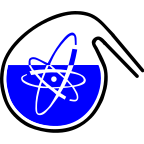Speaker
Description
Targeted alpha particle therapy (TAT), which uses radionuclides emitting alpha particles is one of the promising possibilities for the treatment of a broad range of malignancies. A short range of alpha particles in soft tissues (approx. 50-100 μm) and high linear energy transfer (LET) allows to destroy tumor cells effectively. Precise targeting by appropriate carrier should ensure efficient and accurate destruction of target cancer tissue while keeping healthy tissues intact. Currently, there are only few such radionuclides that are suitable for use in nuclear medicine. Two widely employed radionuclides, the Ra-223 and the Ac-225, are among the most potential radionuclides suitable for targeted alpha therapy [1].
Nanoparticles can serve as suitable radionuclide carriers for TAT, particularly considering their ability to at least partially stop the progeny recoils spread and keep the daughter atoms immobilised in their structure. At the same time these nanoparticles can be surface-modified, which may improve their targeting, stability and other biological and chemical properties [2, 3].
Nanoparticles of α-zirconium phosphate (α-ZrP) were selected and tested as potential carriers of Ra-223 and Ac-225 in this study. Nanoparticles of α-ZrP were prepared by the reaction of zirconium oxychloride octahydrate aqueous solution with sodium dihydrogen phosphate solution in hydrochloric acid under reflux. The prepared particles were washed by deionised water and then redispersed in ultrapure water. The size of the particles was determined using dynamic light scattering method and the Ζ-potentials were also measured.
Consequently, samples were labelled in aqueous solution with Ra-223 and Ac-225. The labelling yield exceeded 98 % in most cases both for Ra-223 and Ac-225. Subsequently, in vitro stability studies were carried out in four biological matrices: blood serum, blood plasma, saline and 5% albumin solution during 48 h period. Measurements of released activities revealed that samples exhibit the highest stability in saline. Released activity of Ra-223, Ac-225 and their daughter radionuclides was around 0,5 %. On the other hand, the lowest stability was shown in blood plasma for Ra-223, where released activity was above 15 % and 18% for Pb-211 and Bi-211 after 48h. In blood serum was measured highest release activity for Ac-225 (close to 18 %) and its daughter radionuclides Fr-221 (more than 20%) and Bi-213 (above 32 %).
This work was supported by Technology Agency of the Czech Republic (TJ04000129) and Czech Technical University in Prague (SGS22/188/OHK4/3T/14).
[1] KIM, Young-Seung, et al. An overview of targeted alpha therapy. Tumor biology, 2012, 33(3).
[2] MAJKOWSKA-PILIP, Agnieszka, et al. "Nanoparticles in targeted alpha therapy." Nanomaterials. 2020, 10(7)
[3] KOZEMPEL, Ján, et al. Progress in targeted alpha-particle therapy. What we
learned about recoils release from in vivo generators. Molecules, 2018,
23(3)

